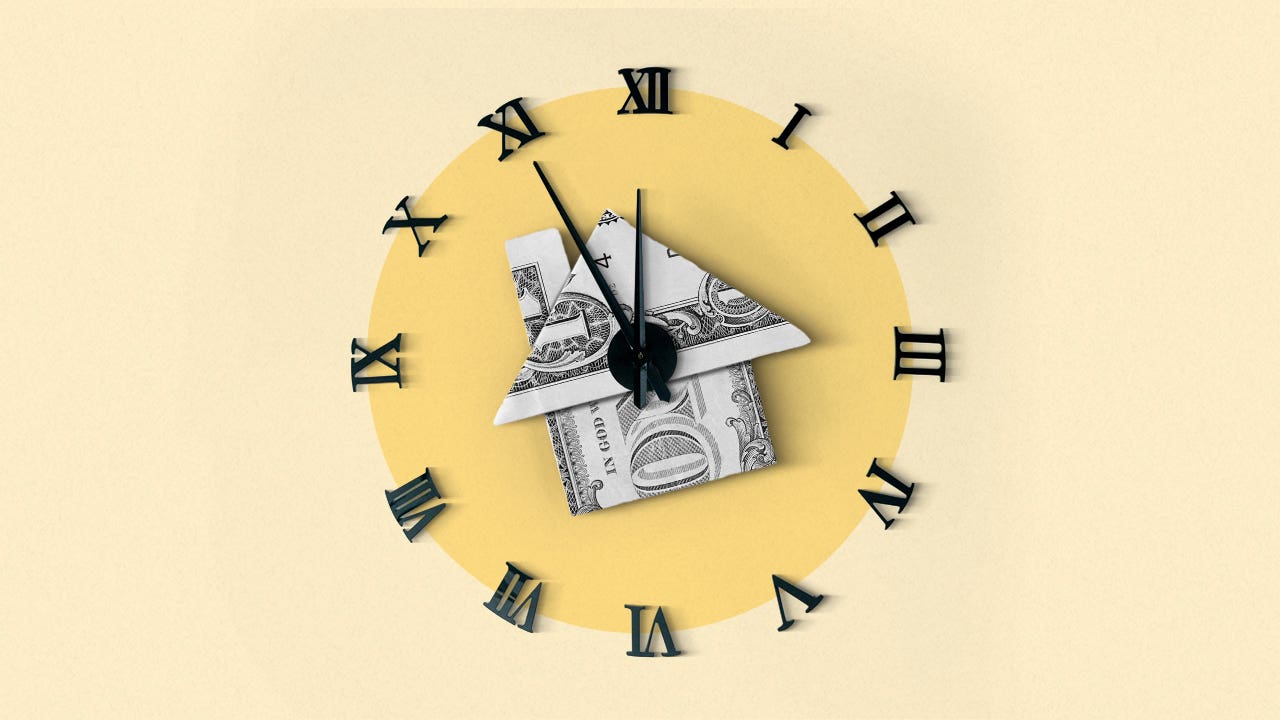
Images by GetTyimages. Illustrations by Hunter Newton/Bankrate
When you take out a mortgage, you agree to pay it back over years or decades. But that doesn’t mean you can’t pay it back quickly. Let’s take a look at how to pay your mortgage in advance, profits and drawbacks, and how much you can save.
How do mortgage advances work?
Mortgage advance simply means paying off your loan early. Usually, when you pay a mortgage every month, you send a certain amount to your mortgage servicer. That regular mortgage payment includes all the elements of PITI, which represent principals, interest, taxes and insurance.
When you pay extras on a mortgage, you are sending more money than you would expect from the original loan agreement. Make sure the service applies additional money directly to the loan principal, not the interest. This will allow you to pay off your loan faster and save money with interest.
Example: How much can you save on additional mortgage payments?
Let’s say you take out a $400,000 mortgage at 6.8% interest rate. Monthly mortgage principal and total interest of $2,608. If you are making additional mortgage payments, you should:
| payment method | Time to pay off the loan | Total Interest | Total interest saved |
|---|---|---|---|
| $2,608 a month | 30 years | $538,772 | $0 |
| Payment of one extra $2,608 per month | 24 years | $412,772 | $126,000 |
| Added $100 a month | 27 years and 2 months | $469,589 | $69,183 |
| Added $50 a month | 28 years and 4 months | $501,359 | $37,413 |
Additional Mortgage Payment Calculator
Use an additional payment calculator to estimate how additional payments will affect your mortgage.
Please access the calculator
What is a prepayment penalty?
The prepayment penalty is when a mortgage is paid early, when the lender, which is usually the percentage of the loan principal, charges the fee. Most borrowers are not eligible for advance penalties, but please check and confirm closed disclosures before putting additional funds into the principal.
How to pay a mortgage advance
There are four main ways to make additional payments to your mortgage.
- Payment once a year
- Every other week payment
- Additional payments at your discretion
- Recast
No matter which method (method combination) is chosen, make sure the servicer applies additional payments to the loan principal. If not specified, the additional money will instead pay both principal and interest for the next monthly mortgage payment. This will help you pay your loan faster and save interest, but not enough to pay the principal.
One extra payment
You can advance your mortgage by adding a monthly payment once a year. Using the example above, you can choose to pay an additional $2,608 each January.
Every other week payment
You can also make an extra payment every year with your biweekly mortgage payment. This method splits your monthly payment in half and pays half every two weeks. You will pay 26 in a year. This is equivalent to 13 monthly payments.
Additional payments
You can always pay more to the principal of your loan. Some borrowers do this with windfalls, including unexpected bonuses and inheritances. Others regularly reduce additional payments if they are permitted in their monthly budget.
I’ll re-create my mortgage
If you have a lump sum available to direct your mortgage (often at least $10,000), consider recasting your loan. With a fee, lenders will reorganize their loans on a new payment schedule. Your loan term will remain the same, but you will have less repayments. Plus, they maintain the same mortgage rate. This is a greater potential benefit than refinancing and could potentially be trapped in today’s mortgage rise rates. Please note that some lenders do not offer recasts.
However, if you do, you can save a lot of money. Suppose you have a $400,000 mortgage with a 6.8% interest rate and receive $75,000 in inheritance over 10 years. Applying all $75,000 to your existing balance ($336,834) will reduce your monthly payment to $1,998.68. Future interest payments are also based on small amounts.
Here are some reasons to consider paying off your mortgage before your schedule:
- You want to save interest: By paying extra principal, you can reduce the time it takes to repay your loan and save money with interest.
- You will soon be selling your home: Early repayment of your mortgage will build stocks more quickly in your home. This means you can increase your revenue when you sell.
- You prefer less debt: Mortgages are primarily considered “good debt,” but you may want to pay it off for peace of mind. Doing so will eliminate the risk of defaulting your loan if future circumstances change.
- You are ready to retire: If you are approaching retirement and are hoping to reduce your income, paying an extra fee for your mortgage could help you prepare.
Questions to ask yourself before paying extra for your mortgage
When deciding whether to pay additional fees on a mortgage, take a look at your overall financial situation. There are a few important questions to consider.
- Do you already have a solid monthly budget? If so, you may not want to put your limited discretionary funds into your mortgage, a relatively inexpensive loan.
- Is your income a variable or is it unpredictable? Consider saving additional funds for a time when it’s not getting too much in.
- How long are you planning to stay at your home? If you are already nearing repayment of your mortgage, it may make sense to add your payments elsewhere and invest additional funds.
- Do you have the right one? Emergency Savings Fund? If not, focus on building these savings first. Costs for at least 3-6 months.
- you Save enough for retirement? If you are unsure if you have saved enough, use a retirement calculator.
- Are there any credit card balances or other loans with higher interest rates? Mortgages are not as expensive as other forms of debt, so it makes more sense to pay back the balance of your credit card or other loans before your mortgage.
If you answered “yes” to any of these questions, you may be better off refraining from paying your mortgage advance until you’re financially safe.
Linda Bell, senior writer for Bankrate, said: “Additional dollars will cut your loan and save your interest.”










